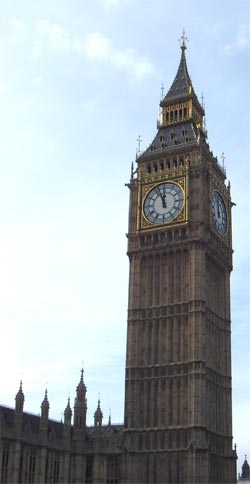| Département d'anglais | Press and media | Suggested reading | Seminars and texts | Lectures and presentations | Links |

|
Civilisation britannique/British history, institutions and society |
|
Seminars (TDs) Andréa Baron, Anne-Claire Cauhapé and Fabienne Gaspari, 12 one-hour sessions (group A Monday 1.30 room 318 ACC, gp B Monday 9.30 room 121 AB, group C Monday 11.30 room 134 ACC, group D Friday 10.00 room 121 ACC) Week 2 27 Feb to 3 March. Document one. Document two The Labour government under Prime Minister Clement Attlee implemented the vast majority of its manifesto promises between 1945 and 1951: nationalisation of the essential infrastructures, introduction of a welfare system with, in particular, the NHS (National Health Service) and the first major steps towards the resolution of the British Empire. The Labour government was also confronted with a difficult foreign policy climate, with the division of the world into two major blocs, East and West, in what became known as the Cold War. It was Winston Churchill who referred to the "iron curtain" and the "special relationship" in his speech at Fulton Missouri in March 1946, but it fell to Labour, and especially its outstanding Foreign Secretary Ernest Bevin, to lead Britain through these difficult years. The economic situation was also hugely problematic, especially in the immediate aftermath of World War Two when the United States abruptly put an end to Lend-Lease and insisted on convertibility of sterling in return for a vital loan. The Marshall plan, along with a determined policy of "austerity" and a vigorous export drive, helped Britain recover from its postwar "financial Dunkirk", despite (or with the help of?) devaluation in 1949. Weary after six years in government, on top of five years as part of the wartime coalition, the Attlee government narrowly lost the 1951 general election to Winston Churchill's Conservatives. Little did they imagine that they would not return to office for thirteen years. Churchill's Conservatives also felt they had to tread carefully. After all, while they had won the election in terms of seats in the House of Commons, they had actually polled fewer votes than Labour. The Conservatives were careful not to attempt to dismantle the Welfare State or to impose any massive denationalisation. Some saw a degree of consensus between the later years of the 1945-1951 Labour government, and the policies pursued by its last Chancellor of the Exchequer Hugh Gaitskell, and the first years of the Conservative government under Churchill, as pursued by the Chancellor RAB Butler, and a journalist coined the term "Butskellism" to describe this apparent agreement. However there were undoubtedly substantial differences in terms of goals and priorities and it is generally believed today that while one may talk in terms of a postwar settlement, there was no genuine postwar consensus. Labour believed it had been robbed of the dividend of the hard and unpopular austerity which had handed over a relatively prosperous economy which the Conservatives were quick to exploit as a valuable political asset. After the brief Prime Ministership of Anthony Eden, who brought his career to an unhappy end over the Suez crisis, Harold Macmillan felt able to say that the British "had never had it so good". Macmillan resumed the withdrawal from empire which had been brought to a halt during Winston Churchill's term of office. The first African state to be granted independence was Ghana, in 1957. Macmillan realised that the independence movements that were gaining strength all over Africa were inevitable, and he felt very clearlt that trying to oppose them could simply drive them into the waiting arms of the Soviet bloc. He courageously went to South Africa to tell the parliament this, in a speech which has become famous for its assertion that there was a "wind of change" blowing across the continent. Document one is an extract from that speech. There was change within Britain too, with increasing pressure for greater personal freedom. While it is the "swinging" sixties which are generally given the credit for making the most progress in this area, with the abolition of the death penalty, the legalisation (or "decriminalisation") of abortion and homsexuality, the relaxation of the divorce laws and censorship of the screen and stage and of course the free availability of the contraceptive pill, to name only the most significant of the changes, the fifties had paved the way for this increasingly "permissive" society. The sixties was a decade of outstanding artistic and cultural invention. Music, theatre and cinema were areas of vibrant energy. Fashion became available to the masses. Cars and television became things which most people owned or hoped to own soon. It was hoped that planning would help the economy regain strength, and that the "scientific revolution" would make people's lives easier (see document two, an extract from a speech made by Harold Wilson in 1963). Increased educational opportunities for all would help create a more meritocratic society. However the sixties were also a time when it was realised that the welfare state had not eliminated poverty. Relations with the trade unions became increasingly strained, and the economy came under increasing pressure, and Britain was forced to devalue in 1967. Britain had to reduce its role in the world and accelerate the pace of its policy to withdraw from military bases "east of Suez". The heady optimism of the 1960s began to give way to a certain sense of disappointment, even disillusion. The tensions created by the Vietnam war had a major imapct in Britain, and while student unrest in Britain was no match for "mai 68", there was still a powerful "youth movement". A strong youth culture found inspiration and expression in rock music (see The Who, "My Generation", for example, or The Rolling Stones and "Street Fighting Man").
|